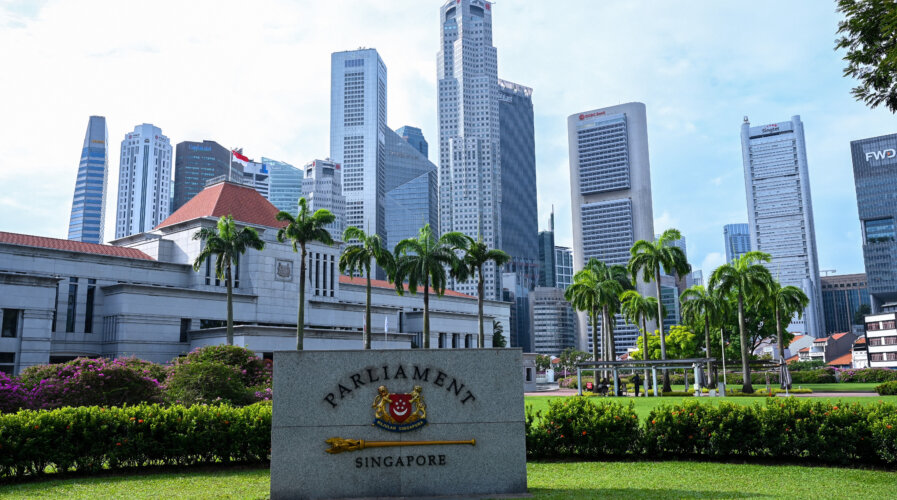
Singapore is devising a law on online safety. Here’s everything we know so far. (Photo by Roslan RAHMAN / AFP)
Singapore is devising a law on online safety. Here’s everything we know so far
- The Online Criminal Harms Bill, introduced for the first reading in Singapore parliament on Monday, is expected to turn into law without many hurdles.
- The bill, part of a more comprehensive suite of laws, is aimed at cracking down on illicit activities online.
- Separately, Vietnam is preparing to make it mandatory for social media users to verify their identity to rein in online scams.
Singapore is joining global peers in drawing up a law granting regulators the power to police online content. An Online Criminal Harms Bill, allowing the authorities to act early against suspected online crimes, was tabled in Parliament on May 8. Since the city island has long defended the need for laws to police content on the internet, the bill is highly likely to pass into law without solid opposition.
Aimed at lowering the legal threshold for the authorities to act against those who commit or abet online crimes, the bill is part of a more comprehensive “suite of legislation” to protect Singaporeans online, the Ministry of Home Affairs said in a statement.
“It is the next piece in our suite of legislation, including the Protection from Online Falsehoods and Manipulation Act, the Foreign Interference (Countermeasures) Act, and the recently amended Broadcasting Act, to better protect the public in Singapore from various harms in the online space,” the ministry said.
Given its role as a financial hub, the island is especially vulnerable to fake news and misinformation campaigns. “Earlier this year, 23 men were arrested in an operation against online child sexual exploitation, including for transmitting obscene materials. In 2022, 32 drug offenders were arrested in operation against drug transactions conducted through chat apps,” the ministry noted.
Data also shows that scams and malicious cyber activities have increased in Singapore in recent years, thus highlighting the urgency to have such a law. Last year alone, 33,669 scams and cybercrime cases were reported, a 25.2% increase from 2021, and more than S$660 million was lost to scams, the ministry noted.
Phishing, often an attack vector for scams and malicious cyber activities, has increased significantly. Approximately 8,500 phishing attempts were reported to SingCERT in 2022, and the ministry shared more than double the 3,100 phishing attempts reported in 2021.
Key features of the soon-to-be law in Singapore
If passed, it will allow the Singaporean Government to tell individuals, entities, online and Internet service providers, and app stores to remove or block access to content it suspects is being used to commit crimes.
Other Directions may also be issued, including;
- Stop Communication Direction. This requires the Direction recipient to stop communicating specified online content (including substantially similar content) to people in Singapore. The recipients of the Direction are persons and entities who share such online content.
- Disabling Direction. This requires online service providers to disable specified content (e.g., a post or page) on their service from the view of people in Singapore, which may include identical copies of the content.
- Account Restriction Direction. This requires online service providers to stop an account on their service from communicating in Singapore and/or interacting with people in Singapore.
- Access Blocking Direction. This requires internet service providers to block access to an online location, such as a web domain, from the view of people in Singapore.
- App Removal Direction. This requires app stores to remove an app from their Singapore storefront to stop further app downloads by people in Singapore.
The Ministry of Home Affairs also noted that tackling scams and malicious cyber activities would require close collaboration between the authorities and online services. As with most bills, the Online Criminal Harms Bill also includes a provision for service providers to appeal the Government’s directives.
“The Bill creates a framework to strengthen partnerships with online services to counter scams and malicious cyber activities. Under this framework, the Government can require designated online services to proactively disrupt scams and malicious cyber activities affecting people in Singapore,” the statement added.
Vietnam up its ante to rein online scams
Like most other countries worldwide, Vietnam’s Ministry of Information and Communications (MIC) has been working to replace the outdated 2009 Telecom Law with a new version more suited to today’s digital economy.
As part of its effort, the country is preparing to make it mandatory for social media users of both local and foreign platforms to verify their identity to rein in online scams. State-run Voice of Vietnam (VOV) newspaper reported that individual and organizational users would be subject to the measure.
READ MORE
- Strategies for Democratizing GenAI
- The criticality of endpoint management in cybersecurity and operations
- Ethical AI: The renewed importance of safeguarding data and customer privacy in Generative AI applications
- How Japan balances AI-driven opportunities with cybersecurity needs
- Deploying SASE: Benchmarking your approach


